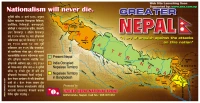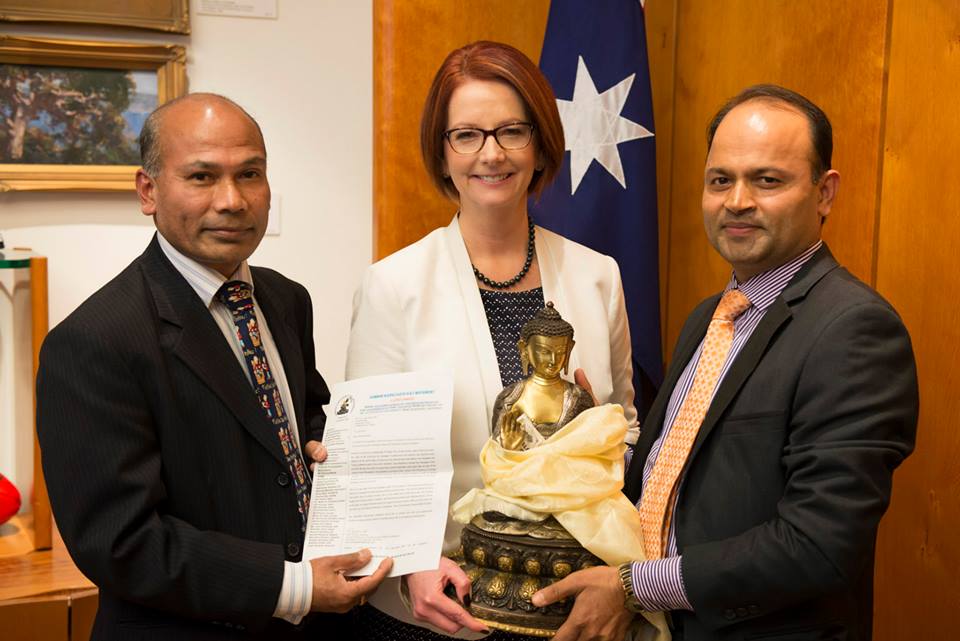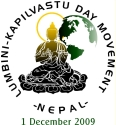What is Sugauli Treaty ?
Posted by Ram Kumar Shrestha on February 1, 2010
By Buddhi Narayan Shrestha
1. Background:
The border treaty signed between the then government of East India Company and Nepal on March 4, 1816 is known as the Sugauli Treaty. The result of the treaty was that Nepal lost almost one-third of its territory on the east, south and west. Students of history know it well why and how the treaty took place. But it would be beneficial for others as well to know the historical background of the country. Late King Prithvi Narayan Shah unified the small fiefdoms / principalities and created a big and powerful Nepal. His descendents continued with the unification and expansion of the country. The East India Company government could not bear Nepal spreading out and becoming stronger. So, they resorted to trickery and deceit in the battles of Nalapani, Jaithak and Makawanpur to defeat the Gorkhalis and forced Nepal to counter-sign in the Sugauli Treaty.
2. Unequal Treaty:
Sugauli Treaty is known as an unequal treaty. Because any treaty is meant to give both the sides more or less equal or equitable benefits even if one side get a little more benefit and the other a little less. But Nepal suffered only losses because of the treaty while the British India gained a huge territorial advantage. The British got the facilities of corridor in the east and in the west, also it got all the facilities and benefits. No provision of facility and concession was made for Nepal. The territory of Nepal that had been unified and expanded to Teesta in the east, Kangara Fort in the West and nearly to the confluence of Ganga and Jamuna in the south, was curbed on all the three sides. So far as the international treaty is concerned, any treaty should be done on the basis of equality, mutual goodwill and understanding, but the British forced Nepal into the treaty under compulsion and duress. Therefore, experts on international treaty view that Nepal may not be forced to recognize the Sugauli treaty as a sound treaty.
3. Sugauli Treaty was not signed willingly by Nepal:
1. The British East India Company prepared the draft of the treaty with the signature of Lieutenant Colonel Paris Bradshaw on December 2, 1815. It was sent to Nepal with a 15-day ultimatum for counter-signature and asked to return it to them. Nepal did not like the terms and conditions of the treaty, so it did not sign within that period. The British then spread rumour that they were launching attack on the capital, Kathmandu, and even carried out troop movement to show Nepal that it was serious. When Nepal thought that the attack on the capital was inevitable, it was forced to accept the treaty.
2. As it was a treaty imposed on Nepal, the King and high ranking officials did not want to sign it. But as Nepal was under duress to accept its terms, Chandrashekhar Upadhyaya, who had accompanied Pandit Gajaraj Mishra to the British camp at Sugauli, put his signature on March 4, 1816 and gave it to them.
3. As Nepal had signed the treaty under coercion after 93 days against the 15-day ultimatum, the treaty came into effect from that day.
4. Validity of the treaty:
1. Article 9 of the treaty says that the treaty shall be approved by the King of Nepal, but there is no record of the treaty being approved by King Girwana Yuddha Bikram Shah.
2. The British had feared that Nepal might not implement the treaty signed on March 4, 1816 by Chandrashekhar Upadhyaya. Therefore, Governor General David Octerloni, on behalf of the British Government, ratified the treaty the same day and the counterpart treaty was handed over to Upadhyaya.
In this way, the treaty, which was signed by Chandrashekhar Upadhyaya for Nepal and by Parish Bradshaw for the Company Government, was approved only by Governor General Octerloni. As the treaty was not approved by the King of Nepal, there can be question and curiosity on the legality of the treaty.
5. Effect of the treaty on Nepal:
There are both direct and indirect consequences of the treaty on Nepal
1. Direct consequences:
i. Before the treaty, the border of Nepal was extended from Teesta in the east to Kangara Fort in the west. The east-west length of Nepal was 1,415 kilometres and the total area was 267,575 square kilometers. Similarly, the distance from Teesta to Sutlej was 1,373 and the area was 204,917 square kilometers.
ii. But the treaty reduced the average east-west length to 885 kilometres and the total area of Nepal is confined to 147,181 square kilometers between the Mechi and the Mahakali Rivers.
iii. This way the treaty cut-off the wings on the east and west and receded its area on the south, losing almost one-third of its total area.
iv. Nepal was forced to give up not only its western front but also the Mechi to Teesta area on the east, where there was no war. In the treaty, it was mentioned that the aforesaid territory shall be evacuated by the Gorkha troops within 40 days from this date.
v. What was more spiteful of the British was that it entered into Titaliya Treaty with Sikkim on February 10, 1817 (11 months after Sugauli Treaty), and gave the land it had snatched away from Nepal to Sikkim
2. Indirect Effects:
i. The treaty had critical effect on Nepal’s sovereignty. For example, the British would take the final decision, if there were any conflict between Sikkim and Nepal.
ii. It brought dishonour to the sacrifices made by Bir Balabhadra and Bhakti Thapa, bravery of Bahadur Shah and Amar Singh Thapa, and the diplomacy of Bhimsen Thapa for the campaign of unification of Nepal.
iii. It sowed the seed of discord between the senior officials and rulers in Nepal. There was one group, which still favoured war with British to take back the territories as Nepal was forced to cede. While another group did not want the war to continue. This conflict averted another war against the British.
iv. Amar Singh Thapa, who had vehemently opposed the Sugauli Treaty that cost Nepal one-third of its territory, sought recluse to Gosainkunda away from the battlefield and he breathed last there.
6. The treaty has laden responsibilities only on Nepal:
The articles, which are burdened on Nepal, are as follows:
1. Article 2: The Rajah of Nipal renounces all claims to the lands which were the subject of discussion between the two states before the war; and acknowledges the right of the Honourable Company to the sovereignty of those lands.
2. Article 3: The Rajah of Nipal hereby cedes to the Honourable the East India Company in perpetuity , viz- The whole of the low lands between the Rivers Kali to Mitchee including the fort and lands of Nagree and the Pass of Nagarcote leading from Morung into the hills, together with the territory lying between that Pass and Nagree. The aforesaid territory shall be evacuated by the Gurkha troops within forty days from this date.
3. Article 5: The Rajah of Nipal renounces for himself, his heirs, and successors, all claim to or connexion with the countries lying to the west of the River Kali and engages never to have any concern with those countries or the inhabitants thereof.
4. Article 6: The Rajah of Nipal engages never to molest or disturb the Rahah of Sikkim in the possession of his territories; but agrees, if any differences shall arise between the State of Nipal and the Rajah of Sikkim, or the subjects of either, that such differences shall be referred to the arbitration of the British Government by whose award the Rajah of Nipal engages to abide.
5. Article 7: The Rajah of Nipal hereby engages never to take or retain in his service any British subject, nor the subject of any European and American State, without the consent of the British Government.
This way, the treaty has virtually no liability on the British side. Any treaty normally demands more or less equal liability and accountability on both sides.
7. The British had doubts that the treaty would be implemented fully:
1. Under Article 4 of the Treaty the British would provide Rs. 200,000 every year to Nepal to please Nepalese officials and to calm down the Gorkha forces from waging another war.
2. Being skeptic that the Gorkhali might not give up the Mechi-Teesta area, which was out of bound of the war, Article 3(5) of the Treaty provisioned that the Gorkhali forces shall vacate from the area within 40 days. To prevent the Gorkhali forces from making claims for the hill area east of Mechi, the British started erecting border pillars just five months after the Sugauli Treaty.
8. The Sugauli Treaty is not for ever:
1. Although Article 3 of the treaty states that the King of Nepal shall relinquish the Terai region from Kali to Koshi in perpetuity. But it is interesting to note that this did not happen everlastingly.
2. Because Nepal restored the plains from Koshi to Rapti after nine months of the treaty. After returning the area, the British stopped paying an amount of Rupees Two Lakhs as mentioned in the treaty. May be, the British thought that the money was worth more than the area which was malaria-infested and covered with forests. Another point, the land was returned so as not to pay the money anymore after becoming sure and certain that Nepal will not wage another war
3. Additionally, Nepal got back the Terai area from Rapti to Kali after 44 years of the Sugauli Treaty. The British gave back this area (Banke, Bardia, Kailali and Kanchanpur districts) and it is known as new territory. It was regained as Jung Bahadur went to India and quelled the Sepoy Mutiny, as requested by East India Company.
4. Had the Sugauli Treaty was done on a permanent basis, Nepal would not have received back those lands at different times. This proves that Sugauli Treaty was not done to last forever.
9. British had felt that they had done injustice to Nepal by forcing the Sugauli Treaty:
1. East India Company was aware that Gorkhalis are not satisfied with the treaty. They have something in their heart that they have done some kind of injustice to the Gorkha army. To console the Gorkha army, they provided two Lakhs of rupees annually as compensation. It could be grasped a sense as the Article 4 of the Treaty says “With a view to indemnify the Chiefs and Bharadars of the State of Nipal, whose interest will suffer by the alienation of the lands ceded, the British Government agrees to settle pensions to the aggregate mount of two Lakhs of rupees per annum on such Chiefs as may be selected by the Rajah of Nipal.”
2. Secondly, the British returned the Tarai land from River Koshi to Rapti on 11 December 1816 at first and second time from Rapti to Kali on 1 November 1860, realizing that Nepal had suffered and was not pleased with the treaty. But they stopped to provide the money after they returned back the east Tarai plain land.
10. There were territorial disputes immediately after the treaty was signed, as it was because Nepal was not happy with the Sugauli treaty :
1. After Nepal lost the plains from Koshi to Kali, there were immediate disputes regarding the northern boundary line of the plains. For example, whether the top Range or the southern foot or northern foot-hill of the Chure Range would be taken as boundary line. In this regard, disputes had erupted in the area from Dunduwa Range of Dang to Arra Nala and Taal Bagoda in 1817, within one year of the signing of the treaty.
2. Similarly, there was dispute in ownership of Antu Danda of Ilam in 1825
3. There was also dispute on the origin of the Mechi River. There was dispute till 1838 whether the river originated from north-east or the one coming from north-west was the source of the Mechi River
4. In 1840, there were claims and counterclaims on the ownership of several villages and settlements of the Ramnagar area
5. There was also ‘mine-and-yours’ controversy regarding the border areas adjoining with Tirhut and Sarun districts of India.
11. As the treaty was not clear about the boundary delimitation, its effects have persisted even to the present time:
1. Actually the treaty failed to mention clearly in so many sections where the borderline would actually pass through. There have been problems in demarcating the boundary line and in erecting border pillars at several places. Now the area of such disputed places has been estimated at around 60,000 hectares. In many of these areas, there are still claims, counter-claims, discussions, controversies and arguments from both sides.
2. The result is that even today there are accusations of encroachment and disputes at 54 places of the Nepal-India borderline. The prominent areas have been identified as Kalapani- Limpiyadhura, Susta, Mechi area, Tanakpur, Sandakpur, Pashupatinagar, Hile Thori etc.
12. Nepal had to bear losses because of its weakness of administration and management:
1. Nepal’s biggest weaknesses was its failure to discuss and deliberate in detail the terms and conditions of the treaty before counter-signing it
2. Nepal had to loose the hill area of Mechi-Teesta portion, which was out of bound of the war. It is because of its administrative weaknesses in putting forth its case and argument to the East India Company, before it was taken away and given to Sikkim.
3. The Rana rulers could not taken initiative on returning the land taken away from Nepal when India gained independence from Britain in 1947. If the Ranas had asked, the British might have returned those lands of Greater Nepal in a single word. There was every possibility of the British rulers in returning Nepal its legacy. One example could be cited that the British divided a single country and created India and Pakistan, including East and West Pakistans, which do not have a common border.
4. But the Ranas might have their own interests. That time the Ranas were already facing difficulties in ruling the country. There were oppositions to their regime. The wave of India’s independence movement had also started blowing towards Nepal. The Ranas thought when they were facing difficulty in managing the territory of their country they already had, adding up new areas would further shorten their regime.
5. Even after the Treaty of Peace and Friendship was signed between Nepal and India on July 31, 1950, the Ranas did not dare to take initiative to restore the areas of Greater Nepal that was lost to the British. Article 8 of the Treaty has clearly mentioned that “So far as matters dealt with herein are concerned, the Treaty cancels all previous treaties, agreements, and engagements entered into on behalf of India between the British Government and the Government of Nepal.” Still Nepalese rulers that time could not raise voices that Sugauli Treaty was thus annulled and Nepal should get back its lost territories.
6. Similarly, Article 8 of a separate treaty signed between Nepal and Britain on October 30, 1950 states that “All treaties, engagements and agreements between the Government of the United Kingdom and the Government of Nepal concluded prior to 21st December 1923 and the Treaty signed at Kathmandu on that date shall cease to have effect from the date on which the present Treaty comes into force in so far as their application between the United Kingdom and Nepal is concerned.” Nepalese administrators then could not show the courage to claim the territories seized from Nepal, with the argument that the new treaty had annulled the Sugauli Treaty. The 104-year Rana oligarchy must have come to an end because history had cursed them. Although the Ranas did not want to get back the lost territories to continue remaining in power, their regime ended on February 18, 1951, after three-and-a-half months of the signing of 1950 Treaty. If they had really been tried and had succeeded in getting back the lost territory, they would have remained illustrious in the history of Nepal even if their rule ended. The other side of the coin is that their regime might have been extended, if they had succeeded in getting back the lost territories from East India Company.
7. Even when no treaty or agreement has been signed between Nepal and Republic of India that would establish present India’s dominion on the Nepalese territories ceded to the British government under Sugauli Treaty, Nepal has not been able to show the courage in claiming its rights on those areas of Greater Nepal because of weaknesses in its administration.
8. The Sugauli Treaty was being partially amended and corrected two times since it was signed in 1816. Besides, Nepal had even got the chance to completely annul the treaty in 1950. But the Rana rulers could not take advantage of the situation. It may because of the fact that they are not dedicated further for the nation.
13. Writ petitions at the Supreme Court to establish Nepal’s territorial rights on the territories lost in the Sugauli Treaty:
1. Section 8 of the Nepal-India Peace and Friendship Treaty-1950 between Nepal and India has annulled the Sugauli Treaty. People like advocate Ramji Bista and nationalists like Yogi Narahari Nath and Phanindra Nepal, who are deeply concerned about the prosperity of the country filed writ petitions on November 4, 1996 and April 21, 1999 respectively at the Supreme Court and pleaded in favour of reinstating Nepal’s rights, thus to reestablish the rights by examining the legality of the Sugauli Treaty and to quash it to the limit that are contrary to the constitution: At the same time they advocated to maintain the territorial integrity of the Kingdom of Nepal and to establish the right of use and possession of the Nepalese people by declaring Sugauli Treaty as invalidated. They pleaded further for the resolution of the constitutional question on the issue of public concern and the right of the Nepalese people; and to attain complete justice. The Rajdhani Daily on June 27, 2003 reported that the Supreme Court on June 26, 2003 quashed the writ saying there was no enough evidence to substantiate the claims for Greater Nepal.
2. In a similar reporting on the same date, Nepal Samacharpatra, another Daily, reported that the Supreme Court had quashed the writs reasoning that the writs on Greater Nepal had failed to clarify what kind of right of information was infringed. But the Supreme Court ordered the government to take seriously the issues of the alterations of the borders between Nepal and India by causing deficits to Nepal and to manage the border issue without causing any harm to the territorial integrity of the country. The Supreme Court in its decision had maintained that the government, under Article 4 and Article 126 (2) Clause C must remain aware and vigilant on the country’s territorial integrity.
14. Conclusion:
The following conclusions could be drawn from the above fact:
1. As Nepalese people have been taking from its onset that Sugauli Treaty was an unequal treaty and, thus, there is no need to let such an unequal treaty to remain in existence any longer
2. As the Treaty of Peace and Friendship between Nepal and India signed on July 31, 1950 and the Treaty between Nepal and the United Kingdom on October 30, 1950 had annulled and invalidated all previous treaties and agreements, thus Nepal should have territorial rights over the areas of Greater Nepal, lost in the Sugauli Treaty,
3. After India gained independence from the British rule, there is no treaty, agreement and understanding regarding domination of the territory of Greater Nepal by the Republic of India. Thus the land captured by British from Nepal should no longer remain under present India’s dominion.
4. India has only been using the territory, which was cut-off from Greater Nepal, but it has no substantive proof of ownership.
5. All nationalist citizens and the Nepalese people firmly believe that the Supreme Court will leave no stone unturned to reestablish the right and dominion of Nepal and the Nepalese on the territories which were cut-off from the Greater Nepal during the Sugauli Treaty, if the writ petitioners submit historical documents and maps that are available in the Library of Congress- USA, British Library- London, National Library of Beijing- China and some other leading libraries of the world.
6It has been proved by the activities of the British during the British India period that Sugauli Treaty was not everlasting. If the treaty was unchangeable the provisions in Articles like: the Nepalese monarch hereby cedes in perpetuity the whole of the low lands between the Rivers Kali and Tista, would have remained unchanged. But as the British themselves retracted from these Articles and returned the Nepalese land at more than one time. This shows that other Articles of the treaty and the treaty as a whole could be annulled one day, if Nepal is powerful and strong enough..
7. Nepalese must realize that Sugauli Treaty is there until Nepal boosts its self-confidence and act accordingly in this regard. For this, we must be able to stand firmly on our feet. We must improve our social status and economic condition to stand on our own feet. Our per capita GDP must increase with our own effort. The Nepalese society can progress, if its economic condition improves. When there is economic and social progress Nepalese could increase their capacity to think logically and rationally. If there is social awareness in the Nepalese society, it will naturally increase the feeling of love for one’s country and patriotism. After fulfilling as these items, one day Nepal will be able to annul the Sugauli Treaty of 1816 which was signed under duress.
15. Remarks:
1. Now, the question is when will Nepal be able to stand on firm legs? The answer would be: Nepalese will become self-reliant, if there are enough employment opportunities inside the country, if there is industrial development and if there is maximum utilization of the natural resources. But the development of industries, development of infrastructure and production of the necessary goods within the country depend on politics and political activities. Therefore, political stability is imperative for the development of the country. If everything within the country is favourable and the Nepalese society becomes fully self-reliant, we can cremate the Sugauli Treaty by restoring the remaining territory of the Greater Nepal that was earned by our ancestors. In this context it could be cited an example: Britain had taken over Hong Kong Kowloon in 1842 under a treaty saying it would be forever. But it was forced to return back the territory to China after 155 years. Similarly, Macao, which was captured 400 years ago by Portugal, was returned to China on December 20, 1999. Now the dialogue is going on for the unification of Taiwan to China. The dialogue has progressed ahead because of its possibility. This is due to the fact that China is becoming a prosperous country. It is going to capture most of the goods and merchandise market of the world. At the same time, it is marching ahead in the political field as well.
2.In such a situation, who can say that the remaining part of Greater Nepal, which was split away only 189 years ago (on March 4, 1816) could not be returned! Who can disagree that the Sugauli Treaty cannot be nullified? But for that, the only thing that remains is that Nepal should be economically and socially developed and the Nepalese should be prosperous. If China had not progressed and prospered economically, socially and politically, it might not have gotten Hong Kong and Macao back. Therefore, if Nepal and the Nepalese also become strong enough economically and socially, no one can say that the remaining Articles of the Sugauli Treaty cannot be revoked. In history, a decade or two is a short period of time. If the present generation cannot do it, the next generation will come forward. The prosperous new generation will retrieve and establish the rights and claims of their fathers and forefathers. Those rights and claims will nullify the remaining Articles and clauses of the Sugauli Treaty.
(read less)
















































Til Bahadur Vishwakarma said
I am very much interested to study or know much about the historical back-ground of Sugauli Sandhi-1816…becoz, I am in Meghalaya where presently communal disturbance arises.We have to put our legacy upon the govt of india,who always treating Nepali speaking people as doubtful category.
Ajay Kumar Patel said
I am a Ph.D. student in management (studying in India) from Birgunj, Nepal. i really like the article and assure you that if we Nepalese arise this issue as a National concern, then we can surely claim our lost territory. the only thing we need to do is to think above regional issues.
Anand said
I am from Raxaul and you might be familiar with that area. I believe in integrity of India as you believe in your country. So don’t even dream of getting that territories back. I am thankful to God that I was born in India. If my place would have been in Nepal I definitely would have no future. Please understand present realities and write history as it is – not extrapolate it to hypothetical dimensions.
You keep your country and try to develop it – not expand it.
Bir Bikram said
Legallly India has to return the terretories back to nepal as an international law .Its is the treaty between nepal and East India company.
Balaji Viswanathan said
India is the rightful successor to British India and it inherits all the territorial rights and responsibilities. We want very friendly relationships with you, but we are in no mood to give an inch of our own territory. Be happy with what you have got and if you work hard you could make that a happy and prosperous one. If you could make your existing territory prosperous like Switzerland or Japan then you could think of extra territories. Till that point stop wishful thinking.
Shreeram said
Why India has no good relationship with all neighbors? India is giving trouble to all neighbors.
Nepal food recipe supplier said
Yes, I also think India has to return the terretories back to Nepal. Since the British left India and they no longer hold the power in India why should India hold the terrorities that British gained. If they want to keep the terrorities then they should learn to respect the Britishers as their great grandfathers like Nepaese do to Prithivinarayan Shah for his great contribution to the unification of Nepal. After all Britishers has done a lot for the India.
Kushal said
Mr. Andand bhaiya, no need to be proud as being an indian, I think you are indicating to the economic progress of yr country to nepal to thank god that u r indian. But never forget the fact, that what is really in india, rape, murder, goons are indians business and specially u bihari, are hated in india itself. SO dont try to be smart.
Pragyan Basnet said
Hello Mr. Anand what are you thinking of yourself. Perhaps you have read the reply of Mr. Kushal. He said that the people of your region are hated in India. This is not only your problem but it is problem of people living in those regions which Nepal had lost after Sugauli Treaty.
mandip upreti said
anand bhaiya itni oversmart hone ki jaroorat nahi hein….agar tumahara saath british ne nahi diya hota to ab tak tum log khag me miljaate…….dont ever try to mess with nepalese…we will get our territories back….we will get it!!!!!
Surendra Lama said
Currently I’ve been employed in Qatar and would like to say that the view of the writer is very true and i completely agree with this. The very true reason that India never wants Nepal to be peaceful, economically self reliant and prosperous is that they never wants us to review the treaties and claim for our lost lands. India always interferes our internal issues and wants instability. So we Nepalese don’t have chance to consider on those issues. I am not against India of course but I don’t like their interference in Nepalese politics and want them to return just the land that they have taken from us. And what I think is the commentator like Mr. Anand from Raxaul is not supposed to use the language of bullying manner and say don’t even dream of getting those territories back. Neither India nor any other countries should take the lands of other weak countries just because they are stronger than those poor countries.
Bhumiraj Tamang said
To return of the land of Nepal from India,we must have to talk with British,because according to the sugauli treaty that was signed by the a British army officer,but we are some confused about the signatory of Nepal,because the signatory have seen unknown person in the treaty.Nepal government must go ahead to talk with both India and British,those two countries are both have no transparency toward poor and small nation.
vivek said
I am going to defence my master thesis very soon. I am a student of Development and international relation in scandinavia. I wrote my thesis on trilateral relation between Nepal, India and China. I was looking for the uneqaul treaty between Nepal and Indía and the mean time i found this blog which is very interesting to read also very fruitful to get some true insight. Thank you very much Ram Kumar Ji. I have also rasied some of the question and tried to be neutral to while criticising in my thesis. I would say all these happened only becasue of the political leaders own interest. After the late King Prithwi Narayan Shah no other king or political leaders of nepal has got courage to rasie the voice for the national interest rather their own self interest.Until the political leaders realized the fact that national interest has to be on top always rather then their own interest, Nepal will not be soverign country to become soverign country solidarity is very important. And solidarity only can be acheived by the national interest. Nepal to be very honest needs a young educated in the related field, energitic leaders to run the country with very new thought and enthusiam. Only then Nepal will be able to over come all above mentioned problems.
Save the nation quite the self interest
Ram Kumar Shrestha said
If you could send part of the thesis in article form, that could be great.
Bhumiraj Tamang said
We the Nepalese people must keep study about this Sugauli treaty because this treaty was not signed by the proper person of the Nepal.The raja Gujaraj and Chandra Shekhar Upadhy were not the Nepalese citizens,they are both India and this treaty was very tricky treaty which was made by British,Indian and the Brahmins.In that time the Brahamins were not migrated in Nepal.The Brahamins are not the original people of Nepal.We must be ready to get back ours lose land from India even late no matter.
abhinav raj mathema said
loved your article… this must of the top most priority now …by which i mean that people now are educated and can do anything they want to only if they have the will …the british government should back us up and india should man up and admit the truth which is written in clean and clear black and blue in the treaty …. our government should stop the grudge they have between themselves and try to solve a problem which is much more bigger than them … india using force to encroach our land forget the land greater nepal used to have the land we have now is being encroached and the government is doning nothing about it …something must be done things like this are things of national integrity it must be brought forward in the society .. the truth must be raveled
kaushal said
Hi This is kaushal from hyderabad. Niether i am going to take india’s side nor i am going to take nepal’s side.
The only few thing which i would like to ask from above readers is:
1 whether the people of Nepal are going to be benefited by this demand? if yes how and when?
2 Whether india will loose anything here, yes, then whats the impact on indian people? if no, then will it change the way indians behave to nepalese?
3 How do you guys rank india on the basis of humanity and frendliness, i dont know other’s but in my surrounding, till now whoever i met never hated a Nepali rather we treated them as a brother, but seems in nepal indian are not treated the same, is it?
4 why do nepal feel india is a country of rapist, murderer, goon’s. I know atleast 1% of population of any other country in this world is having the same kind of people which india has, am i right? If not then haven’t you ever heard of a rape in nepal , any torture to women, any murder in nepal, never saw any goon also? sorry to say but these people are inevetable from society. let it be a western, or an indian, or a chinese society. let it be the most developed country like Britain, USA, japan as well. But there also you will find these people.
Now the question is why we have so many news from INDIA only of having these rapist, goon’s.
So when i say 1% population of any country that seems in indian context of more than 1 crore people. And though like china we have not controled our media to have a proper filteration of news, we get all kind of news here.
I hope people from nepal would now be understaning that why Indians are so bad or are they really bad to have such a nice freind nearby.
From the above article i agree that the Territory which was lost should be given to the nepal back. Let me tell you my friend (assuming the supreme court you are taking here is an indian supreme court) atleast in india you can file a case against the indian government regarding your issues. Think about any other country like china or bangladesh, go and talk to them regarding your territory and tell me the reult. here atleast by having enough prrofs you can atlast get what you want for nepal, but i dont think that same priviliges will be given to you in China as well. Here you go and ask in the indian embassy, they will atleast listen to you and will try to do something about it. INDIA have been fighting from last 5 decades to china and pakistan regarding its teritorry which was captured by both of them. Are they listening to INDIANs. do you think even they will give us the chance to give a proof of having these teritorry as an INDIAN ones. No. they wont.
I know by listening these words you can simply tell that these are indian internal problems. Nepalese can’t comment. yes true you cant comment but atleast stop telling INDIAN’s as traitors.
In the name of few people who might have caused some problem in Nepal i agree, that doesn’t mean that whole clan has to be victimised, right? Rather we need to focus on the beautiful points which india and nepal share together.
India has always helped nepal in their many big project they have arrived before. Many NGO’s are also working in nepal getting some amount of help from indian govt. not only that India have always shown frendliness towards nepal.
And please don’t talk about father’s and forefather’s. what they have done and what we have done. Focus on people’s prosperity. Will the gaining of land back prosper the nepali citizen. no i dont think so. but yes nepalese right is their to have these lands back that you can try but try legaly and peacefully. If we start talking about the father’s and forefather’s thenn most of the citizen from nepal would be vanished. i believe 70 to 80% because most of them are migrated ones. think once about the indus vally civilisation, whereby people came from middle asia and spread across the region and slowly the reached northern UP, northern bihar and then nepal. try reading about the origin of nepal. then start this discussion again. then start thinking about nepal and inida. Think about the 1st human in this world and then think about its my teritorry and its urs.
Man, we should come out of all these bullshits. think about ur surroundings and start working for them. 1st try changing the world within you and then think about the world later.Humanities lies in every human being whther he is a nelpali or an indian. Think in that perspective.
Raj Kumar Rai said
It is clear the level of your knowledge. Do you have knowledge of Int’l law?
Surendra Lama said
I agree with Mr. Kaushal… as we can see he is neither against Nepal nor India. I am not well familiar with these laws, however I believe by blaming each other or showing dissatisfaction, anger, violence etc. these things are not gonna help any of us. This will not merely destroy the relationship between India and Nepal but peace, humanity everything. There should be process for everything and that should be done with care, love and justice…And whether Nepal will not get them back or India will not be able to own them again, we should not consider this matter violently. And Mr. Kaushal Indians are treated well in Nepal too but like you said some stupid and narrow-minded people are everywhere all around the world regardless of developed or undeveloped countries. We should not consider the act of such people as the act of whole nation. I have some Indian friends who work in Nepal and stay with us as our neighbors. We never see them as Indian but as human kind. While talking about nation, we both should respect the laws and the systems of one another. In the case there is conflict on such issues then we should also seek the assistance of international laws. But as long as people have narrow thoughts like my family, my country instead of thoughts that represent whole humankind on earth, the fighting and dissatisfaction never ends. As Mr. Kaushal said we need to focus on people’s prosperity. We need to realize that the people with such thoughts are the reason of today’s destruction of world, terror and instability.
mohan lal himachal pradesh kinnaur said
It is clear the level of your knowledge,do you have knowledge of int’l Low?-Not expand it.
mandip upreti said
but territories should be given coz it belongs to us…….though you said many things in previous articles…..we are possessive!!!!!
suman shrestha said
Helo frens I am from nepal. I knw very wel what happend in past at nepal during the rule of british in india. But i dnt agree that india is the reason y we dnt have our land back. Infact india is the country tht help nepal a lot. Think urself, india is the country we can rely on as our all three side covered by india. As about our land, we not getting it back because of bull shit politician who nly care abt thereself. We can easily get our land back as we already got enuf proof. But our country leaders dnt even care about it. We cant just tell india bad as its our weak government because of which we are nt geting what is our. I knw very wel how indian treat and how nepali treat indian. Lets forget this shit and join our hand together to develop our country. And lets wish baburam wil bring gud reforms. Thank you. Sory fr bad english
Fluke Ti25 said
I visit everyday some sites and information sites to
read content, but this web site presents feature based posts.
Bradley said
I’m really loving the theme/design of your site. Do you ever run into any web browser compatibility problems? A handful of my blog audience have complained about my blog not working correctly in Explorer but looks great in Chrome. Do you have any solutions to help fix this problem?
Tibet Travel Tips said
Hello to all, how is everything, I think every one is getting more from this web page, and your views are pleasant
in support of new viewers.
http://www.youtube.com/watch?v=nZVsUP0m4jY said
It is truly a great and useful piece of information. I am glad that
you shared this useful info with us. Please stay us up to date
like this. Thanks for sharing.
versace prescription glasses said
Hi there everyone, it’s my first visit at this web page, and paragraph is really fruitful in favor of me, keep up posting these types of articles or reviews.
youtube.com said
I know this site provides quality depending articles
or reviews and extra material, is there any other site which gives these things in quality?
click reference said
This is my first time go to see at here and i am in fact happy to read
all at one place.
More Bonuses said
Good web site you’ve got here.. It’s difficult to find excellent writing like yours nowadays.
I really appreciate people like you! Take care!!
montana office space said
Wonderful website. A lot of useful info here. I’m sending it to a few buddies ans also sharing in delicious. And naturally, thanks in your effort!
Useful mini golden retriver Tips said
Oh my goodness! Incredible article dude! Many thanks, However I am experiencing difficulties with
your RSS. I don’t understand why I can’t join it.
Is there anybody else getting similar RSS problems? Anyone that knows the answer will you kindly respond?
Thanx!!
great goldendoodle grooming facts said
Highly descriptive blog, I loved that a lot. Will there be a
part 2?
handy golden retrievers pups information said
Marvelous, what a blog it is! This website provides helpful data
to us, keep it up.
visit for lab vs golden facts said
Hello would you mind stating which blog platform you’re working with? I’m looking to start my own blog in the near future but I’m having a hard time making a decision between BlogEngine/Wordpress/B2evolution and Drupal. The reason I ask is because your design seems different then most blogs and I’m looking for something unique.
P.S Sorry for being off-topic but I had to ask!
Ram Kumar Shrestha said
Depending upon the priority and interest either wordpress or blogspot would be better. I am using these two
Helpful Miniature Retriever Content said
With havin so much content do you ever run into any issues
of plagorism or copyright violation? My site
has a lot of completely unique content I’ve either written myself or outsourced but it seems a lot of it is popping it up all over the internet without my permission. Do you know any ways to help protect against content from being stolen? I’d really appreciate it.
Ram Kumar Shrestha said
Where necessary I mention the source
truck said
I’m impressed, I must say. Rarely do I encounter a blog that’s both equally educative and interesting, and without a doubt, you’ve hit the nail on the head. The problem is something that not enough folks are speaking intelligently about. Now i’m very happy I found this during my hunt for something regarding this.
Lavon said
Before you pick your web hosting site, search online
to learn more about the company background. When it comes to Windows web hosting
India offers many options. Web hosting Pakistan provides genuine hosting
plans that will make your site look smart and dashing.
http://klprovody.ru said
Quite a few Latest Education About Hdmi
%anchor_text% said
In addition to the strength training use order to do p90x in for the changes that you will go through if you see this program to the end.
The physical exercises have an effect on each and every
muscle tissue last for ninety days split up in stages.
Workout 3 then goes on to the muscles we end up order to do p90x in a lot less physically active and then for that reason way
more plump.
Verena said
Below is an also improve your physical condition you’ll find muscular strength and breath p90x cd order use exercise routines.
south korea seoul time said
Howdy! I just would like to give a huge thumbs up for the great
data you have right here on this post. I
shall be coming again to your blog for extra soon.
Nar Balampaki Magar said
The truth is never hide it is come back again but every side must aware the issue..
kunwar prithvi singh chauhan said
This paragraph gives clear idea in favor of the new users of blogging, that truly how to do blogging
and site-building.